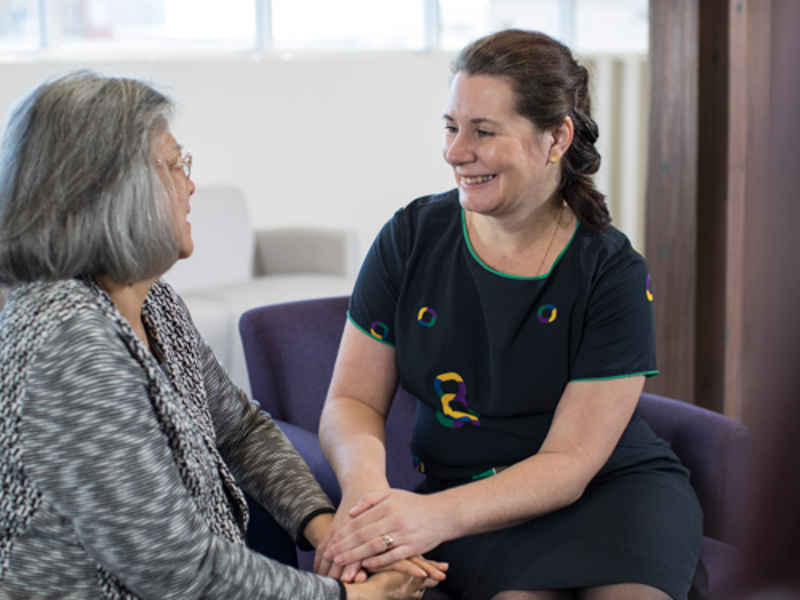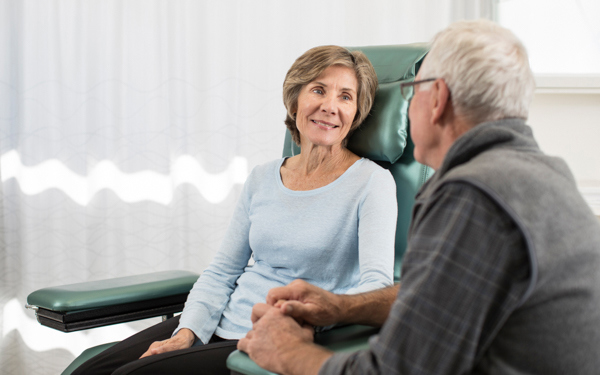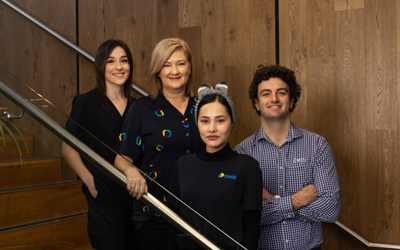What is immunotherapy?
The immune system is made up of cells and organs that protect the body from threats such as infections, toxins and abnormal cell growth. The immune system recognises when a foreign organism, such as a germ, enters the body and attacks it to stop it from harming the body.
Immunotherapy, or biologic therapy, is a type of treatment that uses your own immune system to fight cancer.
Even though the immune system can prevent or slow cancer growth, cancer cells have ways to avoid destruction by the immune system. For example, cancer cells may:
have genetic changes that make them less visible to the immune system
have proteins on their surface that turn off immune cells
change the normal cells around the tumour so they interfere with how the immune system responds to the cancer cells
Immunotherapy helps the immune system to better act against cancer.
How is immunotherapy given?
How often the treatment is given will depend on the type of immunotherapy, the type of cancer, how advanced the cancer is, how the cancer responds to treatment or the side effects you experience. Different forms of immunotherapy may be given in different ways, including orally, directly into a vein through an intravenous injection or infusion (IV), by applying a cream, directly into the bladder, or injected into a tumour.
Download your free cancer diagnosis checklist
Be more informed and play an active role in your own cancer care.

What types of cancer can be treated with immunotherapy?
Since its introduction in 1891, immunotherapy has evolved significantly, including multiple different types of therapies which help the body’s immune system to fight cancer, such as cancer vaccines, monoclonal antibodies, checkpoint inhibitors and Chimeric antigen receptor (CAR) T-cell therapies. Once limited in availability, immunotherapy Australia now includes access to many approved therapies under the Pharmaceutical Benefits Scheme (PBS) for a broader range of cancers.
In Australia, immunotherapy is currently TGA approved for use for the following cancer types:
Non-melanoma skin cancer (cutaneous squamous cell carcinoma and merkel cell carcinomas)
Following several landmark clinical trials both in Australia and globally, immunotherapy has expanded to treat a much broader range of cancer types. Immunotherapy is most commonly used to treat advanced cancers that have spread beyond the area where the cancer first developed, known as secondary or metastatic cancers, and recurrent cancer (when cancer returns after treatment).
As we better understand how cancers grow and multiply, new discoveries are being made and more immunotherapy treatments are becoming available every day.
Immunotherapy can work more effectively when used in combination with other anti-cancer treatments such as chemotherapy and radiation therapy, and many commonly used treatment plans combine these cancer therapies.
How much does immunotherapy cost?
As your treatment is unique to you and your clinical circumstances, a consultation is usually required to give a single and accurate answer to this question. However, there is some key information to remember.
If choosing to be treated by a private provider such as Icon Cancer Centre, private health insurance is required. In Australia, out-of-pocket treatment costs, if any, will depend on your health insurance policy level of cover. At Icon, we have no-gap agreements with most private health funds—this means no out-of-pocket costs—for admitted Medicare Benefits (MBS) services.
Reach out to our team at your nearest Icon Cancer Centre to discuss the cost of immunotherapy treatment.

What are the side effects of immunotherapy?
Immunotherapy side effects can affect people in different ways and will depend on how healthy you are before treatment, your type of cancer, how advanced it is, the type of therapy you are getting, and the dose.
The most common side effects are skin reactions at the needle site, which can include pain, swelling, soreness, redness, itchiness and a rash. You may experience flu-like symptoms, such as fever, chills, weakness, dizziness, nausea or vomiting, muscle or joint aches, fatigue, headache, trouble breathing, and low or high blood pressure.
Other side effects might include swelling and weight gain from fluid retention, heart palpitations, sinus congestion, diarrhoea and risk of infection. Immunotherapy can cause side effects, many of which happen when the immune system that has been revved up to act against the cancer also act against healthy cells and tissues in your body.
Rarer side effects of some immunotherapies, such as immune checkpoint inhibitors can include widespread inflammation.
Depending on the organ of your body that is affected, inflammation can lead to:
changes in skin colour, rash, and feeling itchy, caused by skin inflammation
cough and chest pains, caused by inflammation in the lungs
belly pain and diarrhoea, caused by inflammation in the colon
diabetes, caused by inflammation in the pancreas
hepatitis (inflammation of the liver)
hypophysitis (inflammation of the pituitary gland)
myocarditis (inflammation of the heart muscle)
nephritis (inflammation of the kidney) and impaired kidney function
overactive or underactive thyroid
nervous system problems such as muscle weakness, numbness, and trouble breathing
What types of immunotherapy treatments are available in Australia?
Cancer vaccines
Cancer vaccines are medicines that trigger the body’s immune system to detect cancer cells and either prevent cancer cells from developing or prompt the immune system to fight existing cancer cells.
Non-specific immunotherapies
Non-specific immunotherapies refer to the use of proteins produced by white blood cells to control immune responses that help the body’s immune system destroy cancer cells. They are often given with other cancer treatments, such as chemotherapy or radiation therapy.
Monoclonal antibodies
Monoclonal antibodies, also known as therapeutic antibodies, are immune system proteins designed to attach to specific targets found on cancer cells so that they will be better seen and destroyed by the immune system.
Checkpoint inhibitors
Checkpoint inhibitors are medicines that help the immune system respond more strongly to a tumour by releasing “brakes” that keep T cells (a type of white blood cell and part of the immune system) from killing cancer cells.
CAR T-cell therapy
CAR T-cell therapy is an emerging type of treatment in which a patient’s T cells (a type of immune system cell) are changed in the laboratory so they will attack cancer cells.

Immunotherapy and clinical trials
Immunotherapy represents a completely new approach to cancer treatment. By participating in an immunotherapy clinical trial, you have the opportunity to access a potentially lifesaving treatment and help advance cancer treatment for all Australians.
Of the clinical trials offered at Icon Cancer Centre, 75% of the new clinical trial activity is focused on immunotherapy. Icon is committed to treating our patients with new and novel therapies under our phase 1 trial program. This program has helped patients diagnosed with rare and uncommon cancers or those patients who are no longer appropriate for standard or approved therapies to be treated, meeting a severe unmet need in our community.

Frequently asked questions
Other helpful resources
Find compassionate, expert cancer care close to home.
Our experienced doctors are here to support you with personalised care and access to the latest treatment options.
At Icon, you can feel confident knowing you’re in trusted hands every step of the way.






